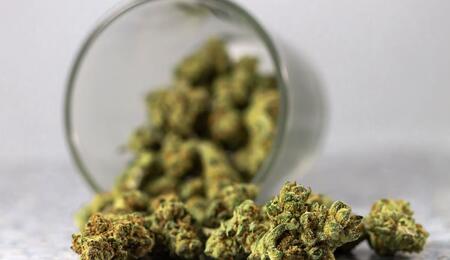The Influence of Cannabis on Hormone Balance

The influence of cannabis on hormones may not be so often emphasized when we discuss the effects of cannabis consumption. However, THC may impact endocrine function, which by default means impact on various hormones produced by the human body. What follows is an overview of how cannabis might affect and influence our hormone balance.
The primary course of action of cannabis in the body is through the endocannabinoid system. Through this system, cannabinoids such as THC, may also affect the Hypothalamic-Pituitary-Gonadal (HPG) axis, one of the main endocrine systems that modulates reproductive function in both males and females. In addition, cannabis may influence the Hypothalamic-Pituitary-Thyroid (HPT) axis, another important neuroendocrine compartment that regulates thyroid hormone levels.
Cannabis Can Have Both Positive and Negative Influence on Hormone Levels
The impact of cannabis on hormones happens because the endocannabinoid system is closely tied with the endocrine system. Research suggests that, in some cases, too much consumption of cannabis might produce negative outcomes for hormones, in particular concerning reproductive health.
Simultaneously, medicinal use of marijuana may be of help to those who show symptoms of hormonal disorders, like changes in menstruation, body weight, hair growth, etc. The most benefit comes from full-spectrum products, where you take cannabis with all the cannabinoids it has in store, terpenes and flavonoids alike. These other minor compounds in cannabis can neutralize the potential adverse effect that THC might sometimes have on hormone balance.
Cannabis, Hormones and Reproductive Function
In women, THC may impede follicular maturation, without which ovulation cannot happen. In addition, THC can also reduce luteinizing hormone (LH) production, which plays a key role in helping the release of an egg from the ovary.
It is important to note that during ovulation, the body releases anandamide - a fatty, acid neurotransmitter (an endo-release also known as the ‘happiness hormone’). Anandamide engages with the cannabinoid receptors CB1 and CB2; too much intake of cannabis may cause an excess release of anandamide, which could push other reproductive hormones out of balance.
On a positive note, cannabis can be particularly helpful during the premenstrual syndrome (PMS); the combined effect of THC and CBD may reduce mood swings, cramps, and other pains that women may experience.
In men, extensive use of cannabis might lead to changes in the testosterone levels. Researchers have reported both increased and decreased testosterone levels in adult males (it would depend individually), but it is considered that these changes have a minimal health effect. Still, this is one of the areas where more research is needed to clear the mud.
According to another study, frequent cannabis use may lead to lowered levels of prolactin, a hormone that principally enables lactation. This hormone is naturally increased in women during pregnancy and breastfeeding. And this just may be one of the reasons why cannabis is not recommended to use while expecting a baby and after giving a birth.
Lowered levels of prolactin in men are usually no cause of worry; although, lowered prolactin is sometimes associated with conditions on the liver and is also seen in people with high aerobic capacity.
Cannabis and Its Impact on the Thyroid Gland
Cannabis may suppress TSH, which is a thyroid stimulating hormone, and this in turn influences the release of thyroxine (T4) and triiodothyronine (T3) from the thyroid. It is the kind of change that can have an impact on a variety of metabolic functions in the body. For example, it might explain frequent bowel movement following excessive or prolonged use of cannabis. Or think of weight loss despite improved appetite with cannabis. Also, palpitations. All of these may be short-lived symptoms that come and go with cannabis ingestion, and not necessarily everyone will experience them. In fact, only few people will.
Any such symptoms would be more pronounced with heavier use of marijuana. Which is why it is important, if you see that you are having recurring episodes with negative side effects from weed, to stop its use or pause, at least temporarily.
Cannabis might contribute to low circulation of T4 and THS levels, which is associated with several other symptoms, among them weight gain, feeling cold, experiencing mood swings, irregular menstruation or weakened libido. These are rare side effects from cannabis (for instance, in most cases weed should enhance the libido). It also may be a pre-existing medical condition in question, which gets aggravated with prolonged exposure to cannabis. It is good to have this information in mind, and in case you notice something is strange for a while now, stop or reduce cannabis use, and check with a health professional.
Cannabis and Growth Hormones
If you’ve ever wondered why supplementing medical cannabis to kids is such a vexed question, it is because weed can tamper with growth hormones. Namely, cannabis also has an impact on the growth hormone (GH) axis, which concerns the releases of somatotropin and insulin. These hormones are of exceptional importance when children are growing up, and as the body develops.
The first one, somatotropin, is a growth-encouraging hormone that dictates cell reproduction and regeneration, in addition to few other metabolic functions. On the other hand, insulin regulates blood sugar levels by processing glucose into the liver, fat tissue, and some of the muscles in the body.
The GH axis is further involved in brain development, stimulating the growth of new neuron cells and preventing or override neural damage. Various cannabis products can help medicate senior patients who suffer from neurodegenerative disorders, however, when it comes to young users, cannabis seems to have a negative overall impact. It can affect cognitive skills in teenage users, which is also one of the reasons why its recreational use is not permitted to minors.
More from Soft Secrets:












